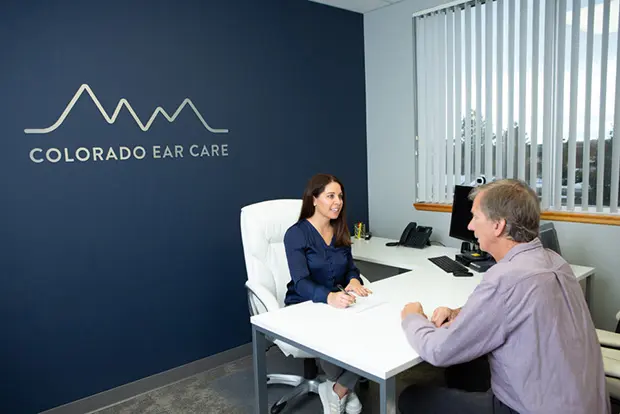Have you ever sat through a lecture or a presentation and felt inexplicably tired afterward? How about a series of Zoom meetings? Exhausting, right? It doesn’t seem to matter how interesting the content was, or how dynamic the speaker was, or even how actively you needed to participate in the meeting — you just feel wiped out afterward. How come? All you did was sit there and listen, right?
Well, that’s just the thing, we tend to consider listening as a completely passive activity, when in actuality, listening, active listening where you’re consciously making an effort to consume and process the information being given to you can actually be quite tiring.
It’s a phenomenon that is referred to as listening fatigue (sometimes called hearing fatigue), and it affects all of us, no matter how healthy our hearing is. But it can be especially taxing for those of us who do have hearing loss. Let’s learn more.
What is listening fatigue?
In the simplest of terms, listening fatigue is the sensory overload that can occur when you’re exposed to sound stimuli for an extended period of time. Our brain, in conjunction with our auditory system, is responsible for processing sound.
When our hearing is damaged, our brain has to work harder to interpret sound. Of course, we’re not consciously aware of the effort that it takes to process sounds, but it results in our feelings of exhaustion nonetheless.
The worse your hearing loss is, the harder you have to work to hear and understand, and the quicker you’ll start feeling the effects of listening fatigue.
This is why so many people with hearing loss begin to isolate themselves. Noisier environments, like restaurants, family gatherings, and even outdoor events can be exhausting. Trying to distinguish between speech sounds and background noise gets harder and harder.
Unfortunately, this tendency to isolate only makes the untreated hearing loss even worse over time.
What can be done about listening fatigue?
No matter if you have hearing loss or not, there are things that you can do in order to alleviate your feelings of listening fatigue. The most important, and perhaps simplest, thing you can do is give your ears a break.
Go outside, take a walk, and try to avoid auditory stimuli like wearing headphones, watching TV, or scrolling through social media. Most days, we’re all absorbing so much information, that taking this time for yourself will do a great deal for your mental, physical, and emotional well-being.
Now, if you’re someone who suspects that you or someone you love might have hearing loss, and are struggling with the effects of listening fatigue, then we highly recommend that you come see us to get your hearing tested.
The earlier we can understand your hearing health, the sooner we can make treatment recommendations that can help you preserve your existing hearing while also helping you better enjoy the social and professional situations that you need to hear your best in.
How can hearing aids help with listening fatigue?
One of the most important things that properly fit hearing aids can do to alleviate the effects of listening fatigue is assisting your brain and auditory center to capture and process sound.
Hearing aids that are precisely programmed to your audiogram — the results of a pure tone hearing exam that showcase the frequencies you’re missing in your hearing — can fill in many of the gaps causing you to have misunderstandings in different listening situations.
Your listening fatigue won’t be completely eliminated, of course. Listening fatigue happens to all of us, after all, but you will likely find yourself with more energy and with a greater capacity to participate in conversations, retain information, and distinguish between different speech sounds, even in certain noisy environments.
Hearing aids can help with more than listening fatigue
Studies have shown that wearing properly fit hearing devices can do more than just help you fill in your frequency gaps and alleviate listening fatigue. Regularly worn hearing aids can also contribute to a delay in cognitive decline.
Untreated hearing loss has been associated with dementia and other cognitive decline-related issues, such as Alzheimer’s. These issues, including the feelings of isolation we earlier mentioned, as well as depression and even anxiety, can all feed on one another and make a previously treatable hearing loss increasingly worse. The best first step in protecting and preserving your hearing is by getting your hearing tested, and getting it tested regularly.
Are you over the age of 50? Then you need annual hearing tests!
At Colorado Ear Care, we believe that the best hearing treatment begins with the best possible hearing tests.
Our goal is not to simply fit everyone in our care with hearing aids, but instead to truly understand everything that we can about their hearing condition, their experiences with potential hearing loss, as well as other personal factors like the situations where their hearing matters most, as well as their ability to invest in their care.
Only then do we feel comfortable making recommendations for treatment. We let your results and our expert recommendations lead the way.
Have you been feeling the effect of listening fatigue? Have seemingly endless Zoom meetings been making you feel even more exhausted than normal? You might be experiencing hearing loss. Contact Colorado Ear Care today for your exam! We’ll test you comprehensively and comfortably in an environment that is dedicated to you and your needs. Contact us today!

